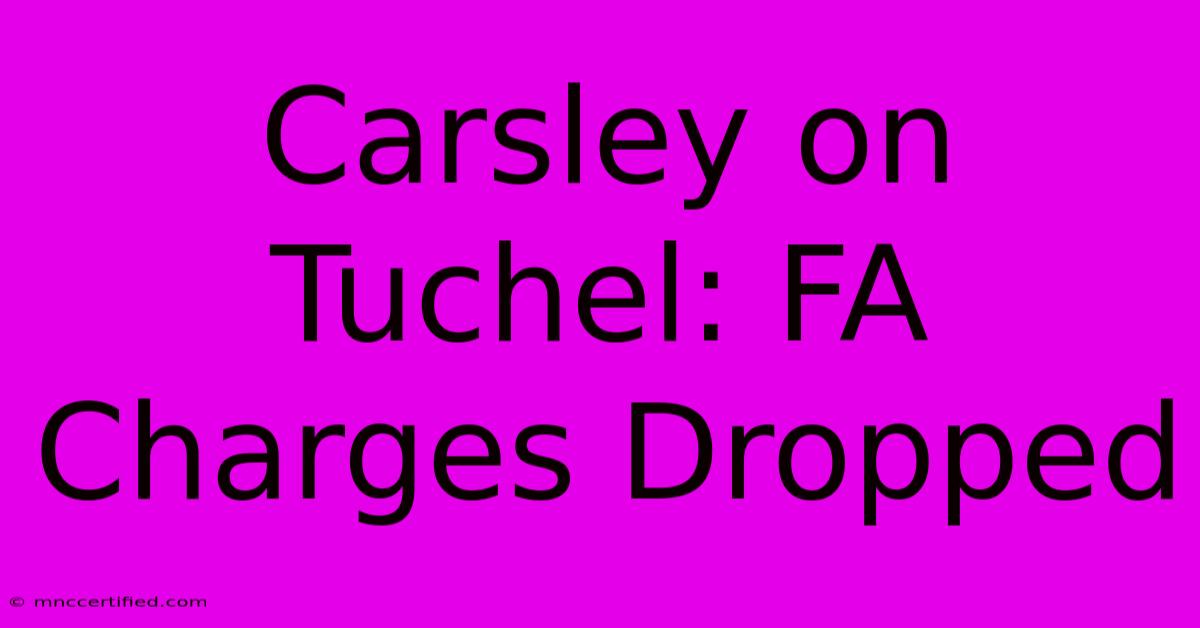Carsley On Tuchel: FA Charges Dropped

Table of Contents
Carsley on Tuchel: FA Charges Dropped – A Deeper Dive into the Aftermath
The Football Association (FA) recently dropped charges against Thomas Tuchel and Conor Gallagher following an incident involving the two managers after a Premier League match. This decision has sparked considerable discussion, and we'll delve into the details, exploring the events leading up to the charges, the FA's reasoning for dropping them, and the broader implications for the game.
The Incident: A Heated Exchange
The incident occurred after a match between Chelsea (then managed by Tuchel) and Everton (featuring Gallagher). A heated exchange ensued between the two managers, leading to the FA issuing charges of improper conduct. While specific details of the argument remain somewhat vague to protect the privacy of those involved, reports suggest a disagreement escalated beyond acceptable levels of post-match conduct. This led to the charges which, at the time, put both managers under scrutiny. The severity of the alleged misconduct was initially unclear, fueling speculation amongst fans and pundits alike.
The Importance of Context: Post-Match Tensions
It’s crucial to acknowledge that post-match confrontations are, unfortunately, not uncommon in football. The high-stakes nature of the game, combined with intense emotions and pressure, can lead to disagreements flaring up between players, coaches, and even staff members. However, the FA sets clear guidelines about appropriate conduct, and any breach of those rules can have consequences.
The FA's Decision: Charges Dropped
The unexpected dropping of the charges against both Tuchel and Gallagher has raised questions. While the FA hasn't provided a detailed explanation, it's likely that the available evidence didn't meet the threshold required for a conviction. This could mean a lack of sufficient compelling evidence, inconsistencies in witness accounts, or perhaps a decision to prioritize the conciliatory aspect of the situation.
Analysis of the FA's Reasoning
The FA's decision emphasizes the importance of due process and the need for substantial evidence to support any charges of improper conduct. While this may disappoint some who felt a stronger penalty was warranted, it underscores the FA's commitment to fair play and a reasoned approach to disciplinary procedures. The lack of transparency around the specific reasons for dropping the charges might lead to continued speculation, but the focus should shift to learning from the incident and promoting better sportsmanship.
Carsley's Perspective and Future Implications
While the FA's decision concludes the formal disciplinary process, the incident itself offers valuable lessons about maintaining professionalism in a highly competitive environment. This event highlights the need for improved communication channels and a commitment from all parties involved in football to fostering a more respectful atmosphere, both on and off the pitch.
Looking Ahead: Promoting Positive Conduct
The FA's actions send a message that they prioritize fair investigation and a just outcome. It’s imperative that both managers and players understand the importance of maintaining their composure in high-pressure situations. The future of the game depends on promoting positive behavior and ensuring the integrity of the sport.
Conclusion: A Case Study in Sportsmanship
The Carsley-Tuchel incident, and the subsequent dropping of FA charges, serves as a valuable case study in the complexities of managing emotions and maintaining professionalism within the intensely competitive world of football. While the charges being dropped might seem like a conclusion, the broader discussion about sportsmanship, fair play, and the need for a respectful environment within the game remains a crucial area of focus moving forward. The incident acts as a reminder of the importance of self-control and the potential consequences – both personal and professional – of letting emotions get the better of one.

Thank you for visiting our website wich cover about Carsley On Tuchel: FA Charges Dropped. We hope the information provided has been useful to you. Feel free to contact us if you have any questions or need further assistance. See you next time and dont miss to bookmark.
Featured Posts
-
One Tree Hills Paul Teal Passes Away At 35
Nov 19, 2024
-
Life Insurance Of Sw Phone Number
Nov 19, 2024
-
Best Croatia Vs Portugal Betting Tips
Nov 19, 2024
-
United Equitable Insurance Claims
Nov 19, 2024
-
Verizon Wireless Dental Insurance
Nov 19, 2024